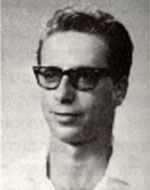Ben-Ari (Okruglinsky), Meir
Meir, son of Fruma and Aryeh, was born on June 7, 1938, in Brigrod, Poland, where his first years of life were difficult: World War II was already on the threshold when he was born, so that his first steps were taken in the shadow of the bunker. Due to Zionist activity, the family was sent to Siberia, where Meir was raised by his 11-year-old sister, while his mother went to work hard to save the family, and Meir and his mother returned to Poland. “M. In 1949 Meir and his mother immigrated to Israel and were housed in a barrack in Rehovot. He was accepted to the “Beit Chinuch” elementary school. Some of the students, members of the veteran moshavah, mocked him for his strange clothes. Meir, who was tolerant by nature, did not respond at first to this attitude, but one day he was forced to return one dose to one of the students and since then the abuse has stopped. After graduating from elementary school, he was accepted to a boarding school in Kibbutz Negba, where he graduated from high school. Meir was drafted into the IDF in mid-August 1956 and assigned to the Armored Corps, and after completing several courses he became a armored corps officer and was appointed a division sergeant in his company. Weizmann, in the heavy water department, he was very devoted to his work, and everyone learned to appreciate his work and rely on him wholeheartedly, and his meticulousness, excellent work and devotion were a symbol and symbol for the entire department. To help her with the arrangements for the house He was promoted to the rank of lieutenant-colonel in 1970. In 1970 he underwent a platoon commander’s course and was promoted to lieutenant-colonel, in which his commanders wrote that Meir was a good officer with excellent professional knowledge and great intelligence. He took two important positions in the study: In the first, he conducted data on the blood types of the population, and these data are now found in several blood banks and bring great benefit to the public. His second work was a study on feeding animals with clean oxygen, but did not finish it. When the Yom Kippur War broke out, Meir was on duty at the Institute. Since he did not receive a summons, he called his unit and was told that he had to join her. After taking care of the replacement, he went to the synagogue to say goodbye to his mother. He then went to the Golan Heights, together with his unit, to fight the invading Syrian forces. On the 13th of Tishrei 5734 (9.10.1973), during a battle in the area of Hoshenia on the oil route, his tank was hit directly and he was killed. He was laid to rest in the cemetery in Rehovot. He left behind a wife, three daughters, a mother and a sister. In his memory, his family held a farewell evening in which his friend’s words were recorded and composed. In an internal newsletter of the Weizmann Institute of Science, things were published in his memory.
